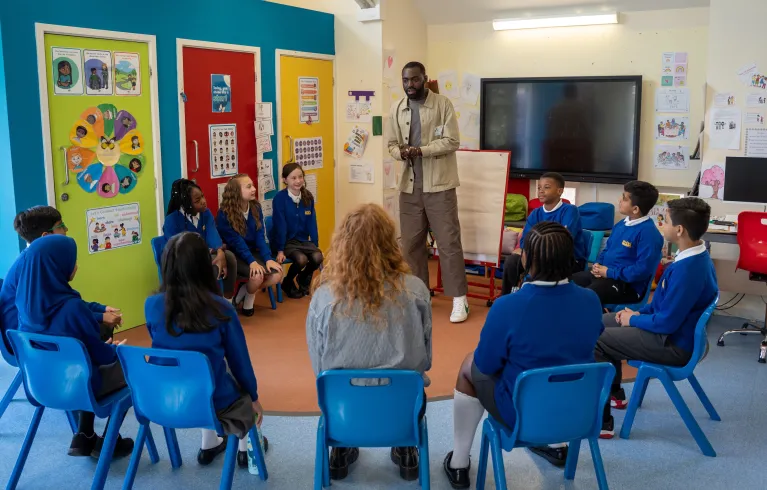
Key information
Publication type: General
Contents
4 sections
The programme
Difference Matters is a new education programme supporting neurodivergent young people in mainstream secondary schools.
The programme aims to improve young people’s experiences of school and reduce absenteeism, suspensions and exclusions. It does this by empowering young people, raising awareness and making schools more neuro-inclusive environments.
Through consultation, we have developed the programme model. This will be tested through a two-year pilot in seven boroughs, launching in Autumn 2025.
Evaluation summary and methodology
Ecorys and Resources for Autism were commissioned to conduct the consultation, carried out between April and July 2024. The consultation aimed to:
- understand the key challenges for neurodivergent young people in education that lead to exclusions, suspensions and non-attendance
- scope out existing initiatives that aim to improve inclusion in schools
- identify good and promising practice and explore any gaps that a new programme could usefully address.
The Ecorys research team conducted interviews, focus groups and consultation meetings with around 50 stakeholders identified as working to deliver support or initiatives for inclusion of neurodivergent young people in educational settings.
Resources for Autism used a combination of surveys, interviews and focus groups to gather the views and experiences of neurodivergent young people and their families. They sought to understand the priority areas that the Difference Matters programme should address and identify neuroinclusive practices that could inform the programme model and content.
Key findings
Difference Matters is guided by key principles drawn from the VRU’s own values and those highlighted by participants in the consultation. It has five core components:
- Student voice: Placing students at the centre of decision-making values their experiences and views. Bringing young people together in a group could also help to create safe social spaces and develop relationships within and across year groups.
- School leadership: Successful implementation requires senior leadership buy-in. A Leadership Action Group ensures commitment at a senior level, supporting accountability and helping to maintain engagement in the programme.
- Action planning: Student and leadership action groups come together to agree the priority areas and develop a plan to achieve desired change, supported by a framework of good practice and resources that schools can draw on.
- Budget: Staff time should be paid for, and budget provided for implementation of the agreed action plan. There should be a focus on low-cost and long-term changes that do not rely on continued funding to support sustainability.
- Shared learning: Participating schools build on evidence and best practice, innovate and adapt, and problem solve. Capturing and sharing the learning will establish a lasting legacy from the programme.
Challenges and lessons
Across neurodivergent young people, their families and professionals there was a consistent message: too often mainstream schools are contributing to high levels of distress for many students, who cannot easily thrive in a one-size-fits-all environment that does not adequately understand their needs and strengths. This distress results in young people feeling unable to attend school or unable to meet the expectations that schools place upon them.
If schools want to address low attendance rates and reduce suspensions and exclusions, they need to look carefully at the experiences of neurodivergent young people in their school and explore how they can offer a more neuroinclusive environment to support all students to learn.
The model presented in the attached report does not offer a simple prescription for changes in a school. Instead, it offers support and guidance for schools to hear from their own students about the barriers that they face and to collaborate with them to find solutions. The model is about flexibility and listening, recognising that the experiences of one neurodivergent student may be very different from the experiences of others. Placing students at the centre of the programme is not only the best way to identify how their individual needs can be met in each unique school context. It's also about valuing the strengths and experiences of young people who are too often told that their perspective doesn’t fit.
Difference Matters provides an opportunity both to support a small number of schools across London to become more neuroinclusive and to build a legacy of learning to share across London and beyond. The programme will generate insights into how schools can be helped to meet the needs of this large and growing section of the student population and offer a test bed for ambitious approaches with the scope to produce genuine change.
Related documents
Difference Matters (Model) Report
Difference Matters (Youth Voice) Report